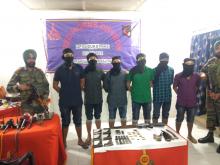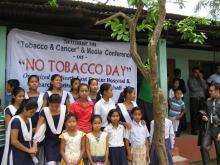Snehalaya, a Guwahati based NGO, has a vision of making Guwahati and the Northeast of India child-friendly. Its interventions focus is on ‘children in need of care and protection and children in conflict with the law’ and in mainstreaming them. As a part of this ongoing efforts it has undertaken a study on Juvenile offences and the Juvenile Justice delivery system in the Kamrup district of Assam. The study on law breaking by persons below 18 years and the handling of their cases by Juvenile Justice Board (JJB), the lawful authority set up by the Government in every district to deal with children, who are in conflict with law. The findings and proposals from this study was released at Guwahati ,by D N Choudhury, Chairman, Police Accountability commission, Assam and a retired Judge of Gauhati High Court on Wednesday, the 7th October,2009.
The study covered 225 pending cases before Juvenile Justice Board (JJB) involving 319 juveniles from the month of September 1989 to September 2008. Out of this 319 pending cases before the Board, there were 8 girls and 311 boys accused of violating the law. The maximum number of pending cases were against the children in the age group of 14-17 years. There were sizeable number of children below the age of 14 years. These cases could have been settled without bringing these children into the juvenile justice system. Most of the juveniles have become adults before their cases are settled by the Board. Along with petty offences of theft, other offences include murder, attempt to murder, sexual offences like rape etc. The maximum number of charges were for theft. Many offences were of serious nature and committed mostly with adults (29.2 percent).11.91 percent of juvenile offenders were from the Noonmati police station followed by Dispur (9.72 percent). The study found delay in settling the cases at every stage of the justice, delivery procedure, reasons for delay being late submission of charge sheets, juveniles becoming untraceable, non-serving of summons, absence of witnesses etc.
The study recommended to set up Juvenile Justice Board office with adequate staff and infrastructure outside the CJM court premises with a full-time magistrate on days of sitting and to establish two separate Juvenile Justice Boards (JJBs) for Kamrup (Metro) and Kamrup (Rural). It also suggested to setup the Special Juvenile Police Unit (SJPU) and empower it adequately so that it can in coordination with JJB enhance police treatment of child offenders. The suggestion was also made to conduct half-yearly review of pendency of cases in the Board as prescribed in Section 14 of the JJ Act taking into confidence all the members of the Board and to set up a special home with specialized psychosocial services at the earliest in Guwahati for juvenile offenders, who need serious reformative intervention.
Regarding the procedure and documentation the study suggested that JJB should strictly adhere to the provisions of juvenile justice which speaks about settling non-serious cases at the first summary inquiry. Delay beyond four to six months would lead to termination of proceedings. The number of witnesses to be minimized and positive disciplinary measures based on discretion and community based programes to be used for non-serious and petty offences. It has also been suggested that the social investigation report of each case should be called for and free legal aid to all juveniles in conflict with the law as provided in the JJ Rule 2007,14(2).
This study is limited to Kamrup district, but it could throw light on functioning of the JJBs in the rest of the districts of Assam as well as in the entire country. Developing of a separate fast track, clearly articulated and child-friendly Juvenile Offence Procedure Code is a concept to be thought of at the national level. A new cadre of juvenile police with adequate qualifications should be raised in every state to handle child offenders. This would not only enhance the police treatment of children but would be a preventive contribution towards the reduction of criminality in the society by their involvement in disciplining children, who are otherwise difficult to discipline. Considering the fact that in many of the cases involving juveniles, they are accomplices to alleged adult criminals, it is suggested that any adult exploiting a minor by involving him or her in criminal activities as accomplice, or misguiding him or her must be meted out additional punishment. Such a provision in the JJ Act would act as a deterrent. This would call for a further amendment to the JJ Act 2000.







Add new comment